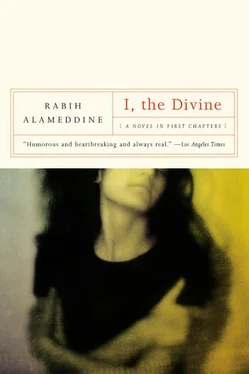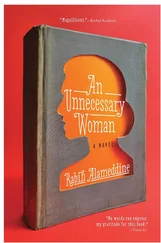The French teacher’s incessant drinking made him an easy mark and therefore Fadi’s favorite target. Assiss drove an older model Vauxhall, which Fadi habitually broke into. During free periods, Fadi and I would push the car out from the spot that Assiss parked it in, roll it down the hill, and park it all the way by the lower entrance. Assiss never figured out how his car got moved.
We had three free periods a week. To this day, I have no idea what would possess a school to give a bunch of teenagers the run of the school unsupervised for an hour. Having arrived from a strict Carmelite school, where the nuns made us account for every nanosecond, I found the new school nothing short of heaven. The free periods were the time when Fadi shone.
Fadi used to brag that there was no lock he could not pick. The easiest were the numbered locks. He taught me how to do it. I had to pull the lock down as hard as possible and then roll each number until I heard a certain click. It was incredibly easy. During free periods, one of our favorite activities was opening lockers to ferret out the best lunch. Neither one of us brought lunch on Wednesday when the free period was in the morning. We looked in every locker until we came across something appetizing. When he felt playful, Fadi switched contents of different lockers causing complete chaos.
Fadi and I were both middle kids from middle-class families, and we were envious of some of the really rich kids who came to school on brand-new bicycles. During our free periods, we got to ride any of the bicycles we wanted. One day, while riding a new-model, three-speed, shiny bike, Fadi was approached by Art Haddad, who, like me, was of mixed Lebanese and American parentage, but who, unlike me, had grown up in the United States. He had come to teach at our school and see if he could “recapture his heritage.” He always treated the students as equals, his American education method, and since he could not have been more than twenty-four or so, the approach was not considered offensive by the kids.
“Great bike,” Art told Fadi. “Must be the newest model.”
“Yes,” Fadi replied. “Would you like to try it?”
The last question was followed by words like wow, sure, gee, golly, man, thanks, incredible, hey wow, amazing, guy, but not in any comprehensible order. Fadi told him he had to get back to class, to lock the bike in the bike rack when he was done. We left for class only to hear later that the owner of the bike had come out to find Mr. Haddad riding it. The kid had a fit. Mr. Haddad had to see the headmaster, who, of course, asked to see Fadi. Fadi said the bike was unlocked and he could not help himself. When Mr. Haddad begged him to ride the bike, Fadi specifically asked him to lock the bike so no one would steal it.
I was not saintly by any means before I met Fadi, nor was I led unwillingly down a path of demonic trickery and shenanigans. I was always a mischievous child. Fadi simply inspired me to greater heights. My father had divorced my mother, sent her packing back to America, and married a younger Lebanese woman. I saw my stepmother as a family intruder and spent most of my childhood trying to make her life miserable. I was so effective that at ten, I was transferred, along with my sisters, to the strictest school in Lebanon, run by a pod of fiendish Carmelite nuns. They were so strict, the punishments so severe, even my stepmother, a firm believer in discipline, could not leave us there. My sisters and I were transferred to different schools three years later. I won the lottery. I ended up in the best school in Lebanon, one where there was absolutely no discipline, where no teacher could raise his voice when talking to a student.
The school I transferred to had an outstanding athletic program. Since it was a boys’ school, and I was the only girl in class, the PE class was geared exclusively toward young males. They played soccer primarily. I fit right in. If there was one thing at which I was superior to Fadi, and, as it turned out, every other boy in class, it was the beautiful game of soccer. I had always been a tomboy and I was blessed with a soccer-playing ability which amazed even those who knew nothing about the game. I showed up with the rest of the class on the soccer field for the first PE class. I was wearing the school’s athletic uniform, a green T-shirt with the school’s logo in yellow, white shorts with the logo in green, white tube socks, and a pair of desert boots. The last was not part of the uniform, but since my stepmother refused to consider buying me athletic shoes, let alone actual soccer shoes, I had to make do. Our PE teacher, Mr. Najjar, could not believe his eyes. He ordered me off the field, screaming and hollering. In later years, I would have been able to describe Mr. Najjar as a male chauvinist pig with the intelligence of a four-year-old, but back then I did not have the vocabulary so I simply called him an ugly-dog-fornicating-son-of-a-whore. I left the field. Fadi followed me, saying we had to go see the headmaster. He took me aside, went to his locker, pulling out a sheet of paper. On it he wrote:
To Whom It May Concern:
I hereby authorize my daughter, Sarah Mustapha Nour el-Din, to participate fully in all physical education classes. I wish her to be treated exactly like the boys. I do not wish her to be traumatized by unfair exclusionary policies. I expect my wishes to be followed or I will take appropriate action.
Sincerely,
Mustapha Hammoud Nour el-Din
I was dumbfounded. I could not believe he would do that.
“Nobody would think this letter is real,” I said.
“Yes, they will.”
“It’s badly written,” I said, alternating my weight between one foot and another, fidgeting. “My father would have written it better.”
“They will believe it,” he replied. “Trust me. I’ve done this many times before. They always believe it.”
“They might call him to check.”
“Look,” he said. “Do you want to play or not?” When I did not reply, he pulled me by the hand toward the headmaster’s office. “It would help if you look traumatized.”
Fadi walked into the headmaster’s office with me. He told the headmaster he had to come because his conscience would not allow him to stand idly by as Mr. Najjar screamed insults at me. Not during his entire stay at the school had he witnessed such repulsive behavior from a teacher, behavior sure to damage a sensitive student like me. I was shocked at his audacity, which the headmaster must have interpreted as my being adequately traumatized. Fadi proceeded to show my faux father’s letter. The headmaster was livid, telling me I was to show up at the next PE class and he would take care of everything. Mr. Najjar was forced to apologize to me publicly, and I became one of the boys. I also became a Fadi devotee.
The first cigarette. In the Lebanese dialect, the words associated with smoking, verbs in particular, are sui generis. You not only smoke a cigarette, you can drink it. The verb to smoke may stand on its own, but the verb to drink cannot, of course, since it implies the drinking of liquids. One must use the phrase drink a cigarette, which sounds ridiculous in any other language. That kind of idiosyncrasy fascinated my thirteen-year-old mind. However, the particular use of the Lebanese dialect which turned out to be an embarrassment was the word inhale. When it comes to cigarettes, one does not inhale in Lebanese, one swallows. So, on a November day, first rain of the season, taking cover in one of the many Turkish arches embedded in the walls along the school grounds, Fadi offered me a cigarette, Marlboro, and asked, “Do you swallow?”
I replied, “Yes, of course.”
I took the cigarette from his pale, nail-bitten fingers, and he proceeded to light it for me. I had seen it done many times. Everyone smoked in Lebanon. I could fool him into thinking I had done this before. I took a drag, but instead of inhaling, I swallowed.
Читать дальше












